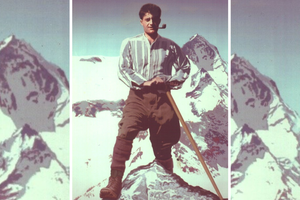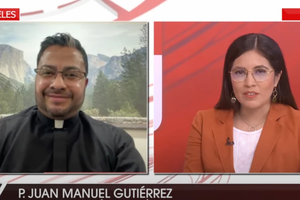Soon-to-Be-Saints Pier Giorgio Frassati and Carlo Acutis Inspire Brotherhood
How three Catholic men’s groups are working to cultivate fraternal fellowship.

After coaching his middle-school theology class’ basketball team, Ryan O’Conner, a teacher at Our Lady of Lourdes parochial school in Denver, saw a prime opportunity to expose these young students to the idea of fraternity through sports.
So he created Frassati Sports, a youth sports program that encourages middle- to high-school-age boys to compete in sports in a Catholic environment.
“While I was coaching basketball, I saw that a kid was standing over a boy, mocking him as he lay injured, and I thought, ‘Oh man, we can do better,’” O’Connor said. “It’s one thing to reject that bad thing and say, ‘All right, we aren’t doing this, anybody,’ but then we also have to replace it with something that is a good thing, and thus Frassati Sports was born.”
“We shoot in between, the middle ground between winning at all costs and encouraging and forming our guys to practice Catholic values on the field through prayer, mentorship and companionship,” he added.
Named after Blessed Pier Giorgio Frassati, the popular young man on the path toward sainthood, O’Connor believes that young boys can learn a lot from observing the example of Frassati and other young saints, like soon-to-be canonized Blessed Carlos Acutis.
“Just the fact that Frassati and Acutis were so young, loved life and were joyful is such a great example for young boys,” O’Connor said. “Blesseds Frassati and Acutis lived in the world but not of the world and had this deep, deep devotion to Jesus and the Eucharist.”
Frassati Sports began by offering a variety of sport summer camps, and in recent years, it has expanded to offer seasonal sports teams and even sports leagues — plus, it offers sport options for girls.
No matter the sport or age level, each team or camp emphasizes prayer and good sportsmanship both on and off the field, teaching the players the importance of teamwork and brotherhood.
“For all our teams and everything else we do, we want the players to grow in solidarity. So we begin all practices and games with prayer, but then we also include spiritual lessons with our sports,” O’Connor said. “For example, in baseball, we always remind our teams that the goal is to help your brothers get home, no matter what — which is a metaphor for heaven. We were meant to get to heaven and help others get there, even if it requires laying down your life, like how in baseball you may need to make a sacrifice bunt.”
Frassati Sports provides lasting lessons and experiences of brotherhood and the faith.
“It is really natural for boys to go through life with teammates,” O’Connor said. “Through these events, we want to show the guys the importance of growing in virtue and learning how to go through life with brothers, and, hopefully, they will carry those lessons with them and apply them in the future.”

Building a Catholic Culture
In a culture inundated with technology, vices and peer pressure, a lack of brotherhood and connectivity can be harmful, Jimmy Mitchell, an author and the director of campus ministry at Tampa Jesuit High School, an all-boys high school, has found.
Teen boys specifically need a vision for Catholic brotherhood, to have older guys to look up to as role models — not an artificial brotherhood rooted in sports, competition and surface-level conversation, but a fraternity built on prayer, accountability and virtuous conversation.
“Look at all the great historical figures, and certainly many of the great saints, throughout human history; none of them achieved greatness alone; you know, all of them along the way found their brothers,” Mitchell said. “Young men in particular need to see a brotherhood, a community of believers in older men, that gives them a vision of what their life is supposed to look like.”
At Tampa Jesuit, Mitchell has prioritized two things: forming peer- and faculty-led discipleship groups and ensuring that the teachers and coaches understood their mission is to form saints through modeling the love of Christ.
“We run close to 10 weekly discipleship groups, each with eight to 12 guys, and we have five summer-immersion trips. This summer, we are taking 104 of our guys to Europe on pilgrimage. So, in each of those environments, in each of those settings, we’re incorporating brotherhood in the same way, by giving them opportunities to talk and live out the Catholic faith,” Mitchell said. “Practically speaking, it’s making sure that there are solid mentors in their lives, which in most cases are teachers, priests and coaches, who are loving these young men as Christ has first loved them.”

This strategy is working: Over the past four years, the school has seen 75 teens convert to the faith after experiencing Christian brotherhood in the school, and a vibrant Catholic culture has emerged within the school community.
“There’s been a beautiful deepening of our Catholic culture here at Jesuit Tampa, where we now see, 15, as many as 22, young men becoming Catholic at the end of every school year,” Mitchell said. “We see more and more upperclassmen desiring to build that culture of brotherhood and be spiritual leaders, big brothers to the underclassmen, and I think right now we’re just at the beginning of seeing a real trickling effect on vocations, as more and more of our young men are open to the priesthood and religious life.”
Diego Mejia Omana arrived at Tampa Jesuit four years ago as a self-proclaimed atheist despite being raised in the faith. Now, as he heads to the University of Notre Dame in the fall, he leaves on fire for his Catholic faith.
He attributes this metanoia to the vibrant brotherhood he experienced in high school.
“One of the fundamental things that led to my reversion was the brotherhood and the Catholic culture at Jesuit. In my freshman year, there was this guy with the exact same class schedule. So we would help each other out, and we became very close friends, even though he was a devout Catholic,” Omana said. “His witness for me through his friendship … and the different ways that he would present the faith to me was so crucial in my reversion. Having seen how important brotherhood was for introducing me to the faith has really inspired me to pursue that same brotherhood with others.”
After he decided to begin practicing the faith again, Omana dove headfirst into the Church, inviting others into this brotherhood and finding ways to be a faith leader within the school.
“After my reversion, I began participating and eventually leading a discipleship and accountability group,” Omana said. “We do daily check-ins; sometimes it was just a text or an in-person check-in at school. Now, since we graduated, we get on a call and discuss our spiritual lives and the ways that the Lord is moving in our lives. It has been really helpful in fighting disordered attachments and vices, as much of the group has been focused on growing in purity and in chastity.”
A Brotherhood for Life
Brotherhood carries well past sports and games — and even youth.
For most of his career, one such man, Jason Craig, has sought to learn about brotherhood and what it takes to create a healthy culture amongst Catholic guys.
Through his studies, he felt called to create the group Fraternus, a lay apostolate that seeks to help form small groups of men of all ages focused on cultivating brotherhood.
“When we started Fraternus, the goal was to stop young boys from leaving the faith,” Craig said. “We started to realize that these young men were leaving the faith because older guys were not mentoring and leading, and a huge weakness in their faith formation was that they lacked Christian brotherhood.”
As he developed content for Fraternus, Craig began studying why men struggle to form brotherhood within American society. He came to realize that America makes it difficult for men.
“When we begin thinking about the practical belonging to one another and really taking care of one another, that is when a brotherhood can form,” he said.
Fraternus seeks to help men of all ages cultivate brotherhood within their local communities by creating and leading dynamic small groups focused on fraternity and resources, such as books and videos. These groups meet every single week to talk about cultivating virtue and faith in men’s daily lives.
“Fraternus has weekly meetings where these men eat together, pray together and study the virtues together,” Craig said. “Each week, they are trying to build upon the virtues and cultivate the basic habits of a devout man, which are receiving Communion in a state of grace and developing spiritual growth through frequenting the sacraments, doing a holy reading daily, and praying the Rosary.”
Fraternus is open to men of all age levels. Groups often have participants who are well into their retirements as well as young fathers who bring their sons to the events. This age integration helps to create a dynamic group, as it provides the younger men with role models to look to for advice and guidance.

“As men, we always see our core identity as either father or son, but we need to recognize that we are both,” Craig said. “We do this through giving and receiving love as men and by learning from the example and encouragement of older generations. I could not be the father without the help of older men. I've learned to be a good father from other good fathers who have done it before that I have observed and listened to.”
Ultimately, these groups provide fellow men to walk with through the highs and lows of life and a support system when the spiritual life becomes difficult.
“The brotherhood of men is so important today in the modern world because we can keep our sins and struggles private so that they eat away at us, and we’re decaying in our loneliness and isolation,” Craig said. “What brotherhood does is expose these things to the light so we can receive healing from Christ, but, also, we can receive the encouragement and accountability from the brothers around us, which we need in order to pursue sainthood.”
This story was updated after posting.
- Keywords:
- blessed pier giorgio frassati
- carlo acutis















